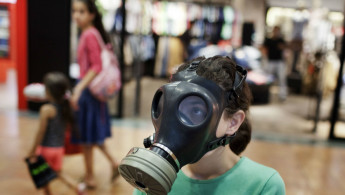How saying 'intifada' spooks Israel
Following the fatal attack on a west Jerusalem synagogue last Tuesday, an Israeli radio anchor made an alarming introductory speech to his morning show.
"This is what the Israeli economy is missing - chaos and indications of a third intifada led by Arabs," he cried out in Hebrew. He, and many other media figures, have been lamenting about the continued decline of the Israeli economy.
Intifada is a word fraught with potential calamities for the Israeli economy. It is also a term that has been frequently employed by media figures in Israel to describe a pattern of attacks on Jewish targets that have taken place over the past two weeks in Jerusalem by Palestinian men.
It also hints at an inability of the Israeli military to put a lid on tensions in the occupied Palestinian territories, an environment that is reaching a point of popular rebellion against the occupation.
Economic downturn
Meanwhile the Israeli economy continues to decline, shrinking 0.4 percent during the third quarter this year.
The Palestinian intellectual, Antoine Shalhat, said that a deteriorating security situation in Jerusalem or Palestinian towns in Israel could lead to a disaster for the Israeli economy. Following months of decline, the economy would not be able to cope with the several consecutive blows that would doubtlessly arise from an intifada.
Describing recent security breaches in Jerusalem as an intifada creates fear among nervous investors, said Shalhat, and will simply serve to further batter an already contracting Israeli real estate market, which relies on security in Israeli towns and cities to thrive.
Hebrew-language business supplements, The Marker and ClickList have both published several reports that indicate a disaster for the country's economy if the present state of chaos is allowed to continue in urban areas under Israeli control.
| Intifada is a word fraught with potential calamities for the Israeli economy. |
When the Second Intifada reached its peak in 2004, the GDP of Israel stood at $100 billion. In 2008, when the security situation for Israel had improved, the economy increased to nearly $175 billion and by the end of 2013, GDP had shot up to $291 billion.
Uncontrollable losses
Meanwhile, the government is dumbfounded by the Israeli economy's sudden turn in fortunes this year.
"There is a big recession in the Israeli economy and the ministries of economy and finance or the Bank of Israel are unable to control it," Shalhat said.
"This recession coincided with the war on the Gaza Strip, which stripped the occupation of a great deal of its economic intactness. The Israeli shekel is also greatly deteriorating, and has depreciated by more than 10 percent against the US dollar."
According to the Bank of Israel, on 19 November the US dollar was worth 3.83 shekels. In June, you could exchange the dollar for just 3.4 shekels.
Economist Muhannad Akel said that tensions in the occupied cities, especially Jerusalem, in addition to the situation in Gaza, could bring the Israeli economy to its knees.
"Presently, we cannot come out with figures about the losses to the Israeli economy as a result of the tensions," he said. "Indications on the ground, however, point to a notable recession registered in consumers' purchasing power, while there are no new [significant] investments into the Israeli market compared with the same period last year.
"Today, the interior cities of Israel are witnessing attacks by Palestinians who are using vehicles, stabbing and choking to defend themselves. These individual operations have decreased greatly the movement of consumers in the markets."
Muein Abu Nassar, of the International Centre of Middle East Political and Economic Studies, says attacks on Israelis have been described as an "intifada" since Palestinian–Israeli talks broke down in April.
Market fears
Since then, Binyamin Netanyahu's government has feared the collapse of security in the West Bank and Gaza. They were right to be concerned.
"The occupation don't seem to know where the next blow will come from," said Abu Nassar. "Therefore, it concluded that the increase in the pace of violence in the interior areas is indeed an intifada. The media describe it as such, and the Israeli economy was the first casualty of this description."
| Binyamin Netanyahu’s government have feared the collapse of security in the West Bank and Gaza. |
Despite the frightened rhetoric in Israeli media, Abu Nassar does not believe that we have reached the point where the instability in Israel and the occupied territories can be described as an intifada.
That is not to say that a new form of revolution against the occupation, led by Palestinians in Israel, is not possible, and might even be imminent.
"I expect the economic effects to bring down Netanyahu's government and this will hit both the Israeli public and private sectors," he said.
According to figures from Israel's Central Bureau of Statistics, the annual economic growth rate during the Second Intifada did not exceed 2.5 percent between 2000 and 2006.
In Shalhat's view, the Israeli army will never be able to completely stop attacks by Palestinians in the interior cities.
The number of Israelis killed in attacks by Palestinians in the past three months exceeds the number of casualties during the past two years, he adds. The Israeli occupation relies on stability and its military prowess for economic growth.
Despite the Israeli government's efforts to downplay these attacks, Shalhat says, the economic figures tell a truth of how fragile Israel really is.
This article is an edited translation from our Arabic edition.



